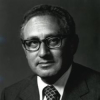Henry A. Kissinger

Henry A. Kissinger
Henry Alfred Kissingeris an American diplomat and political scientist. He served as National Security Advisor and later concurrently as United States Secretary of State in the administrations of presidents Richard Nixon and Gerald Ford. For his actions negotiating the ceasefire in Vietnam, Kissinger received the 1973 Nobel Peace Prize under controversial circumstances, with two members of the committee resigning in protest. Kissinger later sought, unsuccessfully, to return the prize. After his term, his advice has been sought by world leaders...
NationalityGerman
ProfessionStatesman
Date of Birth27 May 1923
CountryGermany
The defining issue is that the government in Taiwan was considered to be the government of all of China, and the authorities in Beijing were not recognized as a government of China. So Taiwan was the residuary for all of China.
Well it did not make excessive sense to say that 20 million people are the recognized government of a billion people that have their own institutions. We did not change it in the sense that we said this has to end, but there was a U.N. vote that transferred the legitimacy of China from Taiwan to Beijing. Beijing was recognized as the government of all of China. Then, under President Carter, we followed what the U.N. had already done eight years earlier.
I have great respect for the Taiwanese. They have done an extraordinary job. But it was not a sustainable position to say that the legitimate government of China resides in Taiwan, which at that time didn't have much contact with the mainland.
The American formal position has been that we oppose violence by governments against their people. That principle should not be abandoned.
Left to its own devices, the State Department machinery tends toward inertia rather than creativity; it is always on the verge of turning itself into an enormous cable machine.
The key decision for a statesman is whether to commit his nation or not. There is no middle course. Once a great nation commits itself, it must prevail. It will acquire no kudos for translating its inner doubts into hesitation.
Diplomats operate through deadlock, which is the way by which two sides can test each other's determination. Even if they have egos for it few heads of government have the time to resolve stalemates, their meetings are too short and the demands of protocol too heavy.
[The New World Order] cannot happen without U.S. participation, as we are the most significant single component. Yes, there will be a New World Order, and it will force the United States to change it's perceptions.
For my generation the relationship with Europe was the central point of American foreign policy. Even during my time in government there was disagreement, sometimes very strong disagreement. But they were all like arguments within a family. I am not sure if the generation which doesn't have these experiences has the same view of things.
I want to get into the President's head some idea of what he can do. If military actions are recommended to him for decision, I want him to know what he is doing when he decides.
Congress can't do much more damage to us than they already have. To this extent we're liberated to do what is right. ... Our successors will be living in a nightmare if we don't do what is right.
an occasion to blow off their frustrations on an issue on which they didn't look as if they are begging (the United States) for help.
a review of withdrawal strategy ... seems in order.
My heart goes out to the president because I've served in an administration that faced a very divided country in a very difficult set of circumstances.